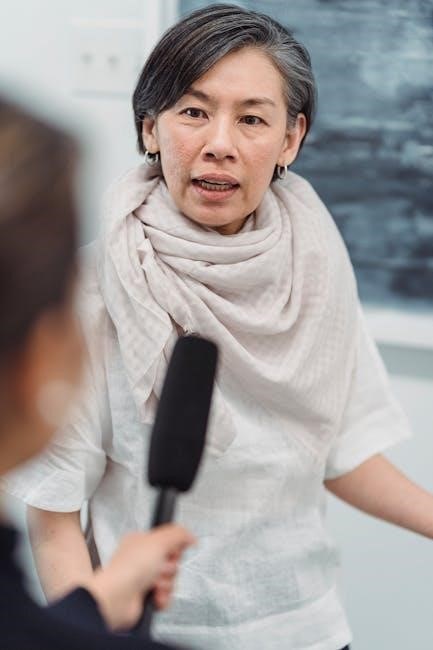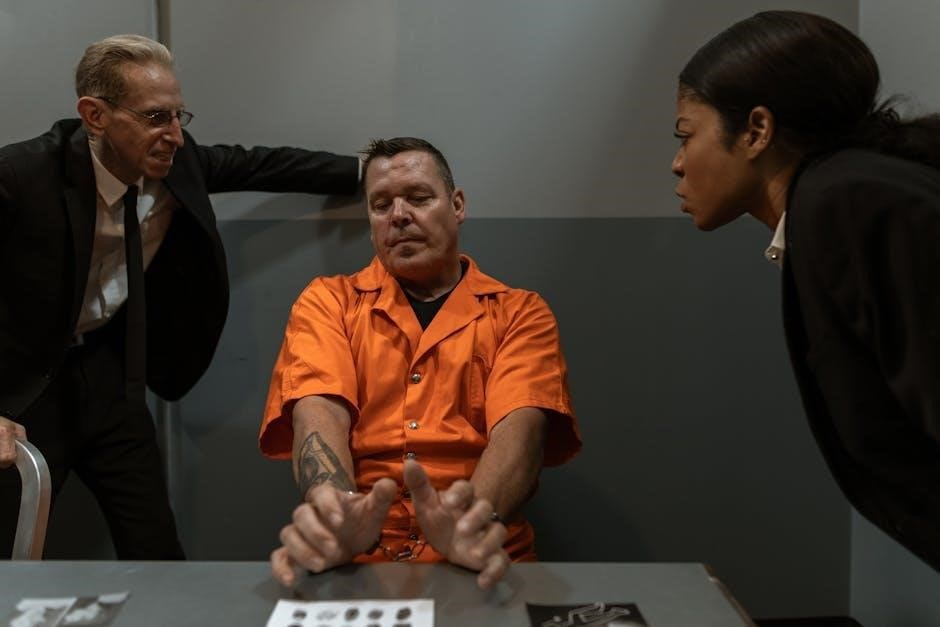Oral history is a vital method for capturing personal experiences and cultural heritage through structured interviews. It preserves memories, offering insights into historical events and individual perspectives. Oral history interview questions pdf provides a guide for conducting meaningful conversations, ensuring comprehensive and engaging storytelling.
What is Oral History?
Oral history is a method of preserving and understanding the past through spoken accounts of individuals who lived through significant events. It involves recording interviews with people who have firsthand experiences, offering unique insights into history, culture, and personal narratives. Unlike written records, oral history captures the emotions, perspectives, and nuances of individuals, making it a rich source of historical information. The process typically involves prepared questions, such as those found in an oral history interview questions pdf, to guide the conversation and ensure comprehensive coverage. This approach not only documents memories but also preserves the voices and stories of people who might otherwise go unrecorded, providing a personal and often overlooked perspective on historical events and cultural traditions. By doing so, oral history bridges the gap between individual experiences and broader historical contexts, creating a valuable resource for research and education.
The Importance of Oral History
Oral history holds immense value as it captures personal narratives, offering unique perspectives on historical events and cultural practices. It provides firsthand accounts that might otherwise be lost, enriching our understanding of the past. By engaging with individuals’ experiences, oral history humanizes history, making it more relatable and accessible. The use of structured oral history interview questions ensures that interviews are comprehensive and meaningful, preserving detailed memories for future generations. This method also empowers individuals to share their stories, fostering a sense of identity and community. Additionally, oral history serves as a valuable educational tool, allowing researchers and students to gain insights into lived experiences and diverse viewpoints, thereby enhancing historical research and cultural preservation efforts.

Preparation for an Oral History Interview
Preparation involves thorough research, selecting suitable interviewees, and setting a comfortable environment. Reviewing oral history interview questions ensures a structured and meaningful conversation, yielding rich insights and personal stories.
Research and Background Knowledge
Conducting thorough research is essential for a meaningful oral history interview. Understanding the historical context, cultural background, and personal experiences of the interviewee ensures relevant and insightful questions. Reviewing documents, such as timelines, biographies, and historical records, helps formulate targeted inquiries. Familiarizing oneself with the interviewee’s life events, achievements, and challenges enables a deeper connection and more engaging dialogue. Additionally, researching the broader historical period provides context, allowing the interviewer to link personal stories to larger societal trends. This preparation not only enhances the quality of the interview but also demonstrates respect for the interviewee’s experiences. Oral history interview questions pdf often emphasize the importance of this foundational research.
Choosing the Right Interviewee
Selecting the right interviewee is crucial for a successful oral history project. The ideal candidate should have firsthand experiences relevant to your research topic and be willing to share their insights. Consider individuals with unique perspectives, such as those who witnessed significant events or have lived through cultural or historical changes. Family members, community leaders, or individuals with specialized knowledge are often excellent choices. Ensure the interviewee feels comfortable sharing their story and is aware of the interview’s purpose. Building trust and rapport is essential for gathering authentic and meaningful narratives. Resources like oral history interview questions pdf often provide guidance on identifying and preparing the right individuals for interviews.
Setting the Interview Environment
Creating a comfortable and conducive environment is essential for a productive oral history interview. Choose a quiet, private space free from distractions, ensuring the interviewee feels at ease. Minimize background noise and interruptions, and consider the seating arrangement to promote open conversation. Establish a rapport with the interviewee beforehand to build trust and encourage candid responses. Ensure all necessary recording equipment is tested and ready, with backup devices available. Provide clear instructions about the interview process and reassure the interviewee of confidentiality. A calm and respectful demeanor from the interviewer can significantly enhance the quality of the conversation. For guidance, refer to resources like the oral history interview questions pdf, which often include tips for setting an ideal environment.

Types of Oral History Interview Questions
Oral history interviews often include life history, family background, career, and cultural questions to explore an individual’s experiences and perspectives. These categories help uncover rich, detailed narratives. For examples, refer to the oral history interview questions pdf.
Life History Questions
Life history questions explore an individual’s experiences and perspectives over time. They often include inquiries about childhood memories, education, career paths, and significant life events. For example, questions like “What were your earliest memories of childhood?” or “How did your education shape your future?” encourage detailed storytelling. These questions help uncover personal growth, challenges, and pivotal moments that define a life. Follow-up questions might delve into emotions or lessons learned from these experiences. Life history questions are essential for creating a comprehensive narrative of an individual’s journey. They provide depth and context, making oral history interviews rich and meaningful. Refer to the oral history interview questions pdf for structured guidance on formulating these inquiries.
Family Background Questions
Family background questions explore an individual’s heritage and upbringing. They often inquire about parents, siblings, and ancestral roots, such as “Where were your parents born?” or “What traditions did your family observe?” These questions uncover cultural influences, family dynamics, and historical contexts that shaped the interviewee’s life. For instance, asking about a grandparent’s occupation or a family’s migration story can reveal deeper insights. Such inquiries help connect personal experiences to broader societal trends. They also highlight how family values and stories have been passed down through generations. The oral history interview questions pdf offers examples of these questions, ensuring a thorough exploration of family history. These questions are vital for understanding the interviewee’s foundational identity and experiences.
Career and Education Questions
Career and education questions in oral history interviews explore an individual’s professional journey and learning experiences. These questions aim to uncover how education shaped their career choices and personal growth. Examples include, “What was your first job?” or “How did you decide on your career path?” They also delve into challenges faced, mentors encountered, and significant achievements. Such inquiries provide insights into societal influences on career decisions and the evolution of professional landscapes. Additionally, asking about educational experiences, like “What was your favorite subject in school?” or “How did your education prepare you for your career?” helps understand the role of learning in shaping their life. The oral history interview questions pdf offers a comprehensive list to guide these discussions, ensuring a detailed and engaging exploration of career and education. These questions highlight the interplay between personal ambition and societal opportunities, offering rich historical context.
Cultural and Identity Questions
Cultural and identity questions in oral history interviews delve into how individuals perceive themselves within their communities and broader society. These questions explore heritage, traditions, and personal identity, offering insights into cultural influences. Examples include, “How do you define your cultural identity?” or “What traditions were important in your family?” They also examine experiences of belonging or exclusion, such as “How did your background shape your sense of self?” These inquiries help uncover the complexities of identity and its evolution over time. The oral history interview questions pdf provides a structured approach to these discussions, ensuring a deep understanding of cultural narratives. By exploring these themes, oral histories reveal the dynamic interplay between personal and collective identity, enriching historical understanding.

Conducting the Oral History Interview
Conducting an oral history interview involves creating a comfortable environment, active listening, and using open-ended questions to foster meaningful dialogue. The oral history interview questions pdf offers a framework to guide the conversation, ensuring a natural flow and capturing detailed narratives. By preparing thoughtful questions and maintaining a respectful tone, interviewers can encourage interviewees to share their stories authentically.
Starting the Interview
Starting an oral history interview requires a thoughtful and organized approach. Begin by establishing a rapport with the interviewee, ensuring they feel comfortable and informed. Introduce the purpose of the interview, explaining how their experiences will contribute to historical understanding. Use the oral history interview questions pdf as a guide to ask introductory questions, such as their name, birthdate, and background. This sets the tone for the conversation, allowing the interviewee to share their story openly. Record the interviewer’s name, location, and date at the beginning for clarity. By starting with clear intentions and a respectful demeanor, you create a foundation for a meaningful and productive dialogue.
Active Listening and Follow-Up Questions
Active listening is essential during an oral history interview to engage deeply with the interviewee’s narrative. Maintain eye contact, nod to show understanding, and use verbal cues like “I see” or “Can you elaborate?” to encourage detailed responses. Follow-up questions are crucial for clarifying points or exploring significant moments further. For example, if an interviewee mentions a challenging time, ask, “How did that experience shape your perspective?” Use the oral history interview questions pdf as a guide to craft open-ended queries that prompt vivid storytelling. Avoid leading questions and allow the interviewee to lead the conversation, ensuring their voice and memories are central to the discussion. This approach fosters trust and yields rich, insightful narratives.
Handling Sensitive Topics
When addressing sensitive topics in oral history interviews, it’s crucial to approach with empathy and care. Create a safe environment where the interviewee feels comfortable sharing personal or painful experiences. Use open-ended, non-leading questions to allow them to express their feelings without pressure. For example, ask, “How did that experience affect you?” rather than “Were you traumatized?” Be patient and allow silence or pauses, as they may need time to reflect. Respect boundaries and avoid pushing for details if the interviewee seems uncomfortable. Refer to the oral history interview questions pdf for guidance on framing sensitive inquiries respectfully. Always prioritize the interviewee’s emotional well-being and dignity during the conversation.
Post-Interview Procedures
After the interview, transcribe the recording, review for accuracy, and store the data securely. Ensure informed consent for sharing and preservation. Refer to the oral history interview questions pdf for detailed steps.
Transcribing the Interview
Transcribing an oral history interview involves converting audio or video recordings into written text. This process ensures the interview is accessible and preserved for future use. Tools like transcription software or professional services can streamline this task. The oral history interview questions pdf often includes tips for accurate transcription, such as using timestamps and noting non-verbal cues. It’s crucial to maintain the interviewee’s voice and intent while ensuring clarity and readability. Reviewing the transcript for errors and consistency is essential before finalizing it for archiving or sharing.
Editing and Reviewing the Transcript
After transcribing, the transcript undergoes editing to ensure clarity and accuracy. This step involves correcting errors, improving readability, and maintaining the interviewee’s original intent. The oral history interview questions pdf often includes guidelines for editors to preserve the speaker’s voice while enhancing understanding. Reviewing the transcript also involves checking for consistency, removing filler words, and ensuring names and dates are accurate. It’s crucial to avoid altering the meaning of the narrative while making it accessible. Finally, the transcript is reviewed by the interviewer or interviewee to confirm its accuracy and completeness before it is archived or shared.
Storing and Preserving the Interview
Proper storage and preservation of oral history interviews ensure their longevity for future generations. Digital recordings should be saved in multiple formats, such as MP3 or WAV, and stored on external hard drives, cloud storage, or DVDs. Organizing files with clear names and metadata, like dates and interviewee names, enhances accessibility. Backup copies should be kept in separate locations to prevent data loss. For physical materials, such as transcripts or notes, consider archiving them in acid-free folders or boxes. Many institutions use specialized software or databases to catalog and manage oral history collections. Regularly updating storage methods ensures compatibility with emerging technologies. The oral history interview questions pdf often includes tips for organizing and preserving interviews effectively. This ensures that valuable historical accounts remain accessible and intact for years to come.
Ethical Considerations
Ethical practices in oral history ensure respect, honesty, and fairness. Informed consent, confidentiality, and cultural sensitivity are essential. The interviewee’s rights and perspectives must always be prioritized. Oral history interview questions pdf emphasizes these principles to maintain trust and integrity in the process.
Informed Consent
Informed consent is a cornerstone of ethical oral history practices, ensuring that interviewees fully understand the purpose and implications of their participation. They must be aware of how their stories will be used, stored, and shared. Consent should be voluntary and informed, with clear communication about the project’s goals, potential risks, and benefits. Interviewees should also be informed about their right to withdraw or request anonymity. A written consent form is often recommended, but verbal consent can be acceptable if documented appropriately. Respect for the interviewee’s autonomy and transparency in the process are vital to maintain trust and integrity. This ethical practice ensures that participants feel comfortable sharing their experiences, knowing their voices are respected and protected.
Confidentiality and Anonymity
Confidentiality and anonymity are crucial in oral history interviews to protect interviewees’ privacy and sensitive information. Researchers must ensure that personal details and shared experiences are handled with care. Anonymity allows participants to share stories without fear of exposure, while confidentiality safeguards against unauthorized access to recordings or transcripts. Interviewers should discuss these options with participants, offering choices about how their identities and stories will be represented; Secure storage and limited access to materials further uphold these principles. Balancing the need for transparency with respect for privacy ensures that oral histories remain a trusted and safe space for sharing personal narratives. This commitment fosters trust and encourages open dialogue, making the oral history process both ethical and meaningful.
Respect for the Interviewee’s Perspective
Respecting the interviewee’s perspective is a cornerstone of ethical oral history practices. Interviewers must approach conversations with empathy, ensuring the narrator feels heard and valued. This involves actively listening without judgment and allowing the interviewee to guide the discussion. Questions should be framed to encourage open and honest sharing, avoiding assumptions or interpretations that might alter the narrator’s intended meaning. It is essential to honor the interviewee’s right to express their experiences and opinions, even if they differ from the interviewer’s views. This respect fosters trust and ensures the authenticity of the oral history record. By prioritizing the interviewee’s voice, researchers uphold the integrity and humanity of the oral history process.
Resources for Oral History Interviews
Oral history interview questions pdf offers comprehensive guides, including sample questions, templates, and tips for conducting effective interviews; These resources ensure well-prepared and meaningful conversations, capturing rich narratives and insights.
Recommended Reading
For those interested in oral history, several books and guides are essential. “Oral History Interviewing for Families” by April Lynne Earle provides practical advice and sample questions. “Interview and Interviewing in Oral History” offers insights into preparation and techniques. Additionally, oral history interview questions pdf is a handy resource, featuring structured queries for life history, family background, and cultural identity. These materials help researchers and enthusiasts alike conduct meaningful interviews, ensuring they capture detailed, personal narratives effectively. They also emphasize ethical considerations and best practices, making them invaluable for anyone embarking on oral history projects.
Online Guides and Templates
Online guides and templates are invaluable resources for conducting oral history interviews. Websites like the Montauk Library and educational platforms offer downloadable templates with sample questions and tips. For instance, the oral history interview questions pdf provides structured queries for life history, family background, and cultural identity. These guides often include ethical considerations, recording tips, and transcription methods. Additionally, organizations like the Pulitzer Center and TNFFA provide detailed handouts for preparing and conducting interviews effectively. These resources are designed to help researchers and enthusiasts create meaningful and well-organized oral history projects, ensuring they capture authentic and detailed narratives.
Tools for Recording and Transcription
Effective recording and transcription tools are essential for oral history interviews. Smartphones, digital voice recorders, and apps like Otter.ai or Rev.com are commonly used for capturing high-quality audio. The oral history interview questions pdf often recommends using external microphones for clarity. For transcription, software like Descript or Sonix offers accurate and efficient solutions. Online platforms provide guides on choosing the right tools and settings to ensure optimal recording conditions. These resources help preserve interviews with precision, making them accessible for future research and analysis. Proper equipment and transcription tools are crucial for maintaining the integrity and detail of oral histories.

Common Mistakes to Avoid
Leading questions, interrupting, and inadequate preparation can undermine oral history interviews. These errors risk altering narratives and reducing the authenticity of collected histories. Oral history interview questions pdf highlights such pitfalls to ensure more genuine and accurate storytelling.
Leading Questions
Leading questions can significantly impact the authenticity of oral history interviews by suggesting specific answers or viewpoints. These questions often contain biases or assumptions, influencing the interviewee’s responses and potentially altering the narrative. For example, asking, “Didn’t you feel scared during the event?” assumes emotions and steers the conversation. This can result in less genuine and reliable accounts. To avoid leading questions, interviewers should frame inquiries neutrally, allowing the interviewee to share their experiences freely. Open-ended questions like “How did you feel during the event?” encourage honest and detailed responses. Resources like the oral history interview questions pdf provide guidance on crafting impartial questions, ensuring the preservation of authentic memories and perspectives. Avoiding leading questions is essential for maintaining the integrity of oral history recordings.
Interrupting the Interviewee
Interrupting the interviewee is a common mistake that can disrupt the flow of an oral history interview. It prevents the speaker from fully expressing their thoughts and memories, potentially omitting valuable details. Allowing the interviewee to share their experiences without interruption fosters a respectful and open dialogue. Patience is key, as pauses or moments of reflection can lead to deeper insights. Interviewers should avoid finishing sentences or jumping to the next question, as this can make the interviewee feel rushed or undervalued. Instead, active listening and subtle nods of encouragement can help guide the conversation naturally. Resources like the oral history interview questions pdf emphasize the importance of creating a comfortable environment where the interviewee feels heard. Avoiding interruptions ensures a more authentic and comprehensive oral history record. This approach respects the interviewee’s perspective and time.
Not Preparing Adequately
Not preparing adequately is a significant mistake in oral history interviews, as it can lead to missed opportunities for meaningful insights. Without prior research or organized questions, the conversation may lack direction, resulting in incomplete or superficial information. Interviewees may feel unprepared or disengaged if the interviewer appears unfamiliar with their background or experiences. A lack of preparation can also lead to awkward silences or irrelevant questions, undermining the interview’s purpose. To avoid this, it’s essential to thoroughly research the interviewee’s background and develop a structured list of questions, such as those found in the oral history interview questions pdf. Proper preparation ensures a respectful and productive dialogue, capturing valuable memories and experiences effectively. This approach honors the interviewee’s time and contributions to the oral history record.
Case Studies and Examples
Notable oral history projects, such as those detailed in the oral history interview questions pdf, highlight successful interviews and their impact on preserving memories and cultural heritage.
Successful Oral History Projects
Successful oral history projects, such as the Montauk Library’s “Oral History Interviewing for Families” and the Harry Williams Center’s initiatives, demonstrate the power of capturing personal narratives. These projects often rely on structured guides like the oral history interview questions pdf to ensure comprehensive and meaningful interviews. For instance, the Montauk Library’s presentation by genealogist April Lynne Earle provided examples of effective questioning techniques, while the Chechen Republic conflict studies showcased how oral histories can document complex historical events. Additionally, projects focusing on specific communities, such as the Chinese American oral history interviews, highlight the importance of cultural preservation. These examples illustrate how well-prepared questions can lead to rich, insightful, and historically significant interviews.
Lessons Learned from Past Interviews
Lessons learned from past oral history interviews emphasize the importance of creating a comfortable environment and building trust with interviewees. Active listening and flexibility in questioning are crucial for capturing authentic narratives. Guides like the oral history interview questions pdf highlight the need for open-ended questions to encourage detailed storytelling. Past interviews have also underscored the significance of ethical considerations, such as obtaining informed consent and respecting confidentiality. Additionally, being prepared for emotional topics and allowing interviewees to share at their own pace fosters deeper connections. These insights ensure that future interviews are conducted with empathy and professionalism, preserving valuable historical accounts for generations to come.
